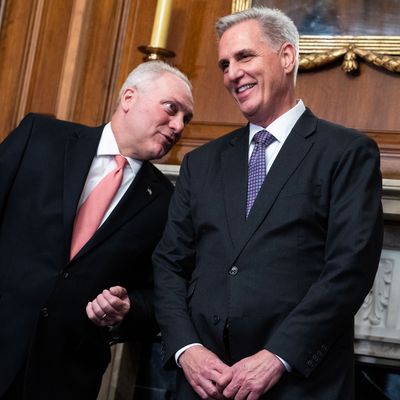
Republicans might have hoped the ouster of House Speaker Kevin McCarthy would offer a blood sacrifice to the savage furies tearing apart the House GOP conference, finally calming things down. No such luck. With the clock ticking on the 45-day stopgap spending deal that led to McCarthy’s demise, and the two parties further apart than ever on more issues than you can count, House Republicans must quickly agree upon and then elect a new Speaker. And this new Speaker will find themselves under the same sword of Damocles, a potential motion to vacate the chair, that eventually fell on McCarthy.
Keep in mind that electing McCarthy took 15 ballots and a ton of concessions to the far-right fringe of the conference thanks to the tiny four-seat Republican majority in the chamber. Even if Republicans decide on a successor more quickly this time, the shutdown deadline is quickly approaching, and the underlying unwillingness of House Republicans to compromise with the Democrats on the country’s must-do business hasn’t changed.
The process for choosing a new Speaker, under the supervision of Speaker pro tempore Patrick McHenry (who is not considered a likely candidate himself), is essentially a hurried-up version of the usual biennial leadership elections. These begin shortly after each general election, with each party nominating its candidate for leader, and conclude with a full House election after the new Congress assembles. McHenry has announced that Republicans will hear candidates for party leadership at closed-door sessions on October 10, and they will select the GOP nominee for Speaker the following day. Then the formal election will be scheduled, with Republicans praying Matt Gaetz & Co. will not withhold their votes once again and shake down the Speaker-designate for more goodies.
The front-runner, House Majority Leader Steve Scalise, has a slightly better reputation with hard-core right-wingers than did his frenemy McCarthy (though Scalise is also battling blood cancer). He may be challenged by House Freedom Caucus member and scandal-monger Jim Jordan, whose election would place an extremist bomb-thrower right in the Speaker’s chair. If that’s not enough to satisfy MAGA folk, Texas congressman Troy Nehls has announced he will place Donald Trump’s name in the hopper to lead House Republicans. That’s theoretically possible under House rules, but Trump has a few other fish to fry and would likely prefer to continue to snipe at House leaders from the sidelines as part of his claim that only his restoration to the presidency can “fix” Washington.
But any GOP candidate for Speaker is going to have to address the 45-day reprieve from a government shutdown that was McCarthy’s undoing and what to do in the extremely likely event that House Republicans cannot reach agreement among themselves and then with Democrats on a broad range of spending and policy topics. Will the would-be Speakers promise a government shutdown? Will they pretend they can magically force Democrats to submit to the will of the anti-government zealots, Ukraine-haters, anti-abortion activists, conspiracy theorists, and fossil-fuel enthusiasts that are so powerful in today’s GOP? That’s unclear. But absolutely nothing in the set of circumstances that led McCarthy to his fatal deal on the stopgap spending bill has changed, other than a fresh and vivid illustration of the danger of showing any reasonableness when you are a Republican leader.
More on politics
- Everyone Biden Has Granted Presidential Pardons and Commutations
- Trump Is Threatening to Invade Panama, Take Back Canal
- What Happened to Texas Congresswoman Kay Granger?






























